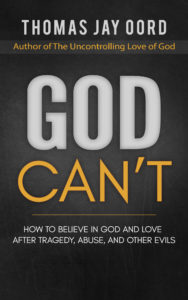The Shack is Right, But…
Wm. Paul Young’s best-selling book, The Shack, tackles questions about God, love, and evil. Young weaves positive themes to offer helpful answers. The book (and movie) continues to spark helpful conversations. (Click the video photo for my theological review).
The Plot
The plot of Young’s fictional story revolves around the abduction and murder of young Missy. The dreadful event devastates the family, especially her father Mac.
Mac cannot understand why a loving and powerful God would allow this evil.
One day, Mac receives a mysterious letter with an invitation to the shack where police found his daughter dead. He accepts the invitation and returns to the scene only to find no one. In despair, he nearly commits suicide.
Upon leaving the shack, Mac encounters a young man who invites him to meet God. Mac accepts and spends several days talking with God, portrayed as a Trinity of three people. He also meets Wisdom personified.
The majority of the story depicts Mac in conversations with God and those who have died. Many of his questions are answered, and Mac begins to transform.
The Shack portrays God as warm, personable and loving rather than stern, wrathful, and aloof. When the Trinity is present, we find joy, laughter, dancing, understanding, and openness.
The Shack asks hard questions, and the answers it offers are mostly helpful. God is not portrayed as evil’s cause, for instance. “I work incredible good out of unspeakable tragedies,” says God. “But that doesn’t mean I orchestrate them.”
God is present with those who suffer: “I’m in the middle of everything, working for your good.” In response to Mac’s anger over Missy’s death, God as Trinity says, “We would like to heal it, if you would let us.”
And when Mac says, “Everyone knows you punish the people who disappoint you,” God corrects him: “No. I don’t need to punish. Sin is its own punishment.”
The Unanswered Question

The Shack doesn’t answer a key question those who suffer often ask: “Why didn’t God prevent the evil I endured?”
Mac asks God, “What good comes from being murdered by a sick monster? Why don’t you stop evil?”
He gets no answer.
“God may not do evil,” says Mac, “but He didn’t stop the evil. How can Papa allow Missy’s death?”
Again, no answer.
“You’re the almighty God with limitless power,” Mac says. “But you let my little girl die. You abandoned her.” God ignores “let my little girl die” and replies to the charge of abandoning, “I was always with her.”
Mac asks the right question. But he receives no answer.
Despite the positive aspects of The Shack, the story offers no believable reason why a good and powerful God fails to prevent genuine evil.
The Problem with Mystery
Several times in The Shack, God says to Mac, “You misunderstand the mystery.”
At one point, the Spirit says, “You’re trying to make sense of the world looking at an incomplete picture.” Wisdom questions Mac’s ability to judge good and evil, implying that he’s not competent to make such judgments.
People who think God could stop evil often appeal to mystery. They rightly say God is smarter than we are. But they mistakenly think our lack of knowledge is the best answer to questions of evil.
When it comes to knowing God, we only know in part. So some ignorance is unavoidable. Our views of God are never 100% true. We see as if looking through a distorted windowpane.
But appealing to mystery on whether we can judge good and evil undercuts belief in God’s love!
Let me explain.
Is God’s Love Evil?
The major idea of The Shack is that we should accept, deep down, that God loves us. I endorse this idea. In fact, believing God loves us, others, and all creation is the most important idea of our lives!
In The Shack, God scolds Mac for thinking he can judge good and evil. Mac is told that has an incomplete picture of life, so he can’t know what is ultimately loving.
But it’s unfair to encourage Mac to believe in love and then question his ability to know what love is. That kind of mystery makes no sense!
If we cannot know what is good, it makes no sense to say God is good. If we don’t know the difference between love and evil, we should feel no joy in thinking God loves us.
After all, this love may be evil!
We should be wary of worshiping a God whose love is mysterious, because we never know whom the Devil he may be!
If The Shack had said God could not prevent evil singlehandedly, it could have avoided the mystery card. It could have answered the central question survivors ask.
I explain the details of what this entails in my book, God Can’t: How to Believe in God and Love after Tragedy, Abuse, and Other Evils (SacraSage 2019). I encourage you to read it for the details.
A Loving Papa
The Shack’s greatest strength may be the picture it paints of an intimately loving God. The book’s characters call God “Papa,” even though God the Father is depicted as a Black woman and the Spirit is an Asian woman.
Papa often talks about being “especially fond” of people. I like that!
Depicting God as a loving parent helps us understand God’s persuasive influence as uncontrolling love. Some people mistakenly think that if God doesn’t control us or creation, God must do nothing. To them, God’s action is either all determining or nonexistent. God either rules all or influences none.
But there’s a middle way between control and absence. That’s the way of love.
Caring parents – Papas – express loving influence that neither overrules nor withdraws. Loving mothers and fathers don’t micromanage or rule with an iron fist. But they aren’t absent either.
Loving fathers and mothers guide, instruct, persuade, call, correct, convince, encourage, nudge, teach, warn, and more.
Perhaps the best word to describe ongoing parental love is “nurture.” Nurturing involves cultivating the lives of children by providing positive experiences, wise instruction, and forgiveness. And nurturing implies working alongside the agencies of others, not controlling them.
Jesus called God “Abba,” a word for an intimately and consistently loving Father. Abba is Papa. If you want to read more on this, check out John Cobb’s book, Jesus’ Abba: The God Who Has Not Failed.
God acts like a loving parent who nurtures children.
We should be wary of worshiping a God whose love is mysterious, because we never know whom the Devil he may be! Share on X[i] Wm. Paul Young, The Shack (Windblown, 2008).



Comments
Tom, did you ever ask Paul Young to reply to your comments about The Shack? I would live to hear His response. Surely, “he is not far from the Kingdom of God”.
Hans – I have been in email correspondence with Paul. But we haven’t talked about this particular issue. Bob Hunter had the idea of asking some podcaster to host a conversation between Paul and me about this. What podcast do you think would be appropriate for this kind of event?
Some great points but the idea that God cannot singlehandedly cannot prevent evil seems like a bigger jump than the idea of embracing mystery. Guess I better read the book….
I hope you do read the book, Mike. Thanks for being open to the ideas.